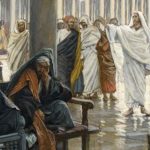Written by Kathy Clubb
Many years ago, Sister Lucy of Fatima coined the term, “diabolical disorientation;” a very apt phrase which is now in common use among orthodox Catholics. Although it referred initially to the clergy, the term is also applied to lay people, and points to those whose minds are so clouded with Modernist doctrines that they fail to recognise glaring inconsistencies between their own words and actions and the Gospel they claim to profess.
This diabolical disorientation is closely aligned with the rise of the Freemasonic principles of liberty, equality and fraternity which have become all-pervasive both within and without the Church. Former Whitehouse speechwriter and now convert to Catholicism, Joshua Charles, clearly identifies the dangers associated with embracing the “virtues” of Freemasonry, which include a shift from man having a supernatural outlook on life to a natural one. He points out that the supernatural virtues, nurtured in man by the assistance of the Holy Ghost, become downgraded to merely natural ones. This doesn’t seem like much of a problem unless one acknowledges, as do Catholics, that only supernatural actions gain merit for our eternal souls. Natural actions, no matter how heroic they may be in human terms, do nothing for the soul and do not help us get to heaven.
Reflected in this naturalistic outlook is the notion of building an earthly utopia, instead of a recognition that we are pilgrims on earth and that heaven is our true home. Another alarming consequence of man’s pursuit of naturalism is the rise in alternative belief systems. As Joshua Charles points out, a loss of faith in the supernatural has not led to a loss of spirituality, but rather to an increase of false spiritualities. This makes perfect sense since man was created for worship and, absent the fullness of the truth, tends to worship convenient gods of his own making.
The fascination many of our Church leaders have with indigenous spirituality is a practical example of diabolical disorientation. This phenomenon clearly shows how, when traditional doctrine is watered down or even rejected, false doctrines move into the vacuum. FLI has written about the very real harms involved with indigenous practices such as smoking ceremonies. Yet, these pagan rituals have become ubiquitous at every level of liturgical practice in Australia – from small school and parish gatherings to national assemblies such as the Plenary Council opening ceremony. One of the outcomes from the Plenary itself was a commitment by the Australian bishops to introduce more indigenous symbols and rituals into Catholic liturgies. It is doubtful that this is wanted by the majority of Australia’s Catholics, or even by most indigenous Catholics.
At the recent launch of its “Reconciliation Action Plan”, the Archdiocese of Sydney included a smoking ceremony, complete with “Welcome to Country”. According to Bishop Daniel Meagher, who was present at the launch, a smoking ceremony is a “culturally appropriate” form of “expressing our need for redemption” in Christ. This is startling when one considers that a non-Christian ritual, one that has been described as “superstitious” and “idolatrous”, is being used to convey the very Christian idea of our need for salvation.
Archbishop Anthony Fisher was also present at the launch, urging us to “commit to acknowledging and healing the relationships with Aboriginal and Torres Strait Islander people.” But what relationships require healing? What exactly would Archbishop Fisher have us do? Such vague platitudes hide the real racism, for it could be suggested that most of the division experienced by Australians over race is due to all tiers of government bending over backwards to accommodate indigenous Australians in ways they simply do not need or expect. Who among us hasn’t been asked in a survey, form or application of some kind whether or not we identify as Aboriginal or Torres Strait Islander? Who hasn’t felt mild indignation at the thought that had we only been able to answer “yes”, we would be lavished with expedited assistance for subsidies, grants and a thousand other benefits? Is this not a form of racism?
A similar program is taking place within the Church, with Aboriginal and Torres Strait Islanders being singled out for special treatment through departments, campaigns and focus days. Catholic bureaucrats constantly inflict on us new “indigenous-friendly” prayers, hymns and liturgies, as though Aboriginals are incapable of understanding the Gospel message unless it is presented in childish, “culturally-appropriate” terms. Somehow, Catholic Aboriginals are deemed to be too simple to appreciate the beauty and goodness of what should be universal prayers and liturgies. This is racism at work within the Church.
Hand-in-hand with the dogged attempts to force faithful Catholics to embrace indigenous-laced liturgies, we see an inversion of the principles of evangelisation. Our Lord’s Great Commission instructed the faithful to go out to unbelievers and “baptise them in the Name of the Father and of the Son and of the Holy Ghost.” However, according to our diabolically disoriented New Evangelisation, it is Christians who must learn from those ignorant of the truth – from those whose religions espouse sexual immorality, infanticide, vengeance and idolatry.
This inversion is evident in the artwork commissioned by the Archdiocese of Sydney to celebrate Reconciliation Week. Entitled, Coming Together, to Gather as One, the image shows, “the Creator moving through Mother Earth and towards the Sky Spirits.” Catholic imagery and symbols are absent, while a disturbing new version of the Trinity is presented: a Creator-god and Spirit could only just rate as being Christian, but the Incarnate God, Second Person of the Trinity, has been usurped by “Mother Earth”. The cross is all but obscured by native Australian fauna, leaving the picture practically devoid of any Christian reference. This blatant rejection of the true, good and beautiful of Catholicism is somehow meant to attract the faithful to the bishops’ foolhardy programme of putting forward indigenous spirituality for our edification?
The usurping of orthodox Christianity by Aboriginal spirituality doesn’t stop at the shores of Australia, however. In recent days, the Vatican has hosted “Reconciliation Week in Rome”, to coincide with the 50th anniversary of the establishment of diplomatic relations between Australia and the Holy See. Events surrounding the anniversary focused almost exclusively on indigenous issues and the environment, with seemingly little acknowledgment of non-indigenous Australians and what matters to them. The well-known Aboriginal spokeswoman, Miriam-Rose Ungunmerr Baumann, headlined the event with several speaking engagements.
One of these talks expounded the concept of “Dadirri”, or “deep listening”, a relaxation and communication technique which has similarities to occult practices like mindfulness. To Miriam-Rose Baumann, it is Dadirri – and not her Catholic faith – which has the potential to bring peace to nations, but that is no obstacle to the deluded Catholics who seem to hang with bated breath on her every word. Deep Listening is espoused by heterodox Catholics such as Fr. Frank Brennan, who was also present in Rome for Reconciliation Week. His talk, “A Contemporary Australian Perspective on the Recognition of Aboriginal Rights”, could well be designed to garner Vatican support for The Voice referendum. Knowing how compliant Catholics were, thanks to the Pope’s ill-founded opinions over Covid restrictions and vaccinations, proponents of The Voice would find official Vatican support for the “Yes” vote extremely valuable.
In any case, championing the rights of indigenous people, while having recourse to occult pagan rituals, is all in a day’s work for those who would convince us that building an “integral ecology” is the real work of the Church. The bishops’ constant barrage of propaganda promoting Aboriginals’ rights and the absence of sound teaching from them show that Sister Lucy’s diabolical disorientation has become institutionalised. More than ever, it is necessary for us to “hold fast to tradition”, setting our sights on the One, True God and rejecting creeping paganism in any of its forms.









